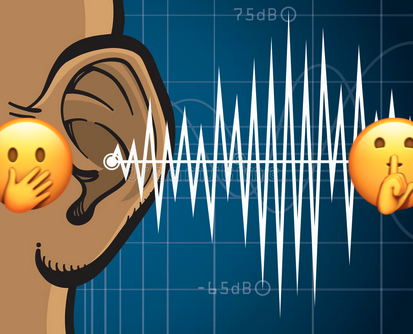Forget your sign, what’s your ‘partner policy’ on other people’s secrets?

My best friend’s husband winked at me during dinner.
We had just sat down, poured our second cough*fourth*cough glasses of wine, and were laughing about some nonsense thing my co-worker had said about her cat hating to be dressed up in hats.
Referring to a long-ago disaster of a date, I simply said, “hats aren’t for everyone,” and looked at my bestie for confirmation that she had got the joke.
She was laughing, but her husband caught my eye… and winked. At me.
The story she had (obviously) told him was pretty harmless, but our friendship goes back a long way — like, frequent bad decision days type of way back — and it made me wonder, ‘what else does he know about me?’
If he had winked at her, there was room to think, “I guess everyone has a hat story.”
But he’d winked at me. And that made me deeply uncomfortable. They’re an established couple and I’ve known him for years. But he’s not my best friend.
I’m excellent at secrets. You can tell me a secret and it will die with me. It will die in my brain along with all the other secrets that other people have told me or I have witnessed and either a. made the conscious effort to keep private, or (most likely) b. forgot. Either way, this brain is a vault.
And this, despite (or perhaps because of) the fact that I have been the topic of a few secrets in my day.
So what is it about being someone’s partner that automatically makes them privy to other people’s deepest darkests? Why do some people think it’s fine to spill the tea on their friends to their partners? And how can you be sure that something a friend knows won’t become something their partner then knows?

It seems like a minor problem. I mean, what’s the big deal?
A cute story, told about someone to someone else, where’s the real harm?
Well, let’s think of the way that humans have evolved to socialise. Family groups, roving bands, and then tribes of humans have always needed to keep each other safe. In order to do that, it was important that we belonged to an in-group. That’s still true today, and though as our basic physical needs are met, we still look for ways to bond with close partners and foster intimacy in a way that suits our digital age. We share information, talk, and invest in one another by trusting each other.
Way back whensies, sharing resources was a way to bond with a group and ensure that the unit remained strong and healthy. We protected our close circle, in an effort to survive the elements and other groups of humans. That means that the closer the connection, the more seriously we take someone else’s safety. Privacy now stands in for safety, particularly when we are all relatively safe. The idea is that we are protecting something about someone, whether physically or emotionally.
It goes both ways
It follows then, that the more tenuous a connection is, the less seriously we take protecting that person. Time and time again, people have shown an astonishing willingness to share intimate details about strangers that they wouldn’t about their friends (and definitely not about themselves!). The popularity of gossip magazines is a testament to this quirk of human nature.
When someone with two degrees of separation knows something about someone else, they’re more likely to tell another person. And that goes on down the chain through all the degrees of separation, right up until Kevin Bacon (hi, Kevin). Not to mention that following a breakup, some people consider all confidentiality agreements totally null and void, thus increasing the degrees of separation to the point of irrelevance, and a secret simply becomes a story.
So how can we make sure that we are treating our friends’ confidences the way we would like ours to be treated?
I propose setting some hard and fast rules. Rules we can all agree to and live by.
Let’s set the stage
In my mind, there are three types of relationships:
- Hanging out. Could be getting to know each other, or simply neither is willing or able to commit to becoming the next type of couple.
- In uncomplicated love. They may live together, and may even have a pet or two, but no kids or many shared purchases and could separate without too much of a logistical headache.
- Long-haul got-your-back. They have mortgages, kids, financial entanglements, and all the rest.
Similarly, we can also delineate friendships:
- We hang out. A couple of drinks here or there, we run in the same circles, but rarely have one-on-one time.
- Close and accepted. Part of the inner circle, always around, involved in the group chat and has been involved in a few cry-it-out moments.
- Are we friends or are we family? These need no explanation, they’ve seen you at your worst, and they still love you.
Next are the secrets:
- Minor embarrassment. You have a problem with locking your keys in the house. You named your first pet after Jonathan Taylor Thomas (RIP furry JTT), etc.
- Avoid going outside for a day or two. You wet the bed. Everyone thinks you quit your last job but were actually fired for showing up still buzzed and calling your boss, “mommy”.
- Better not to think about it. Betrayals, long-term affairs, reasons for going NC with your family.
Game on
Based on the three types of relationships, friendships, and secrets, how would you mix and match when it’s OK to tell a friend’s secret to a partner?
You can see that the formula gets complicated, fast.
So I’ll make it simple for you.
It’s a trick question — the answer is never.
My best friend is my best friend, not the person in their bed.
I mean, think of all the things you know about other people. Things they probably don’t know you know about them. It’s weird, right? Now, think of all the people out there that know things about you — and consider that there are people who don’t even know you or who you are but have heard something about you. Let that shiver up your spine be the reminder that when someone trusts you, you have to honour that.
That’s me, on the record, loud and clear, open and honest. Do with it what you will.
I’m a writer, I tell stories, not secrets. If you want to collaborate, find me here or email me at leduc.julie@gmail.com .




